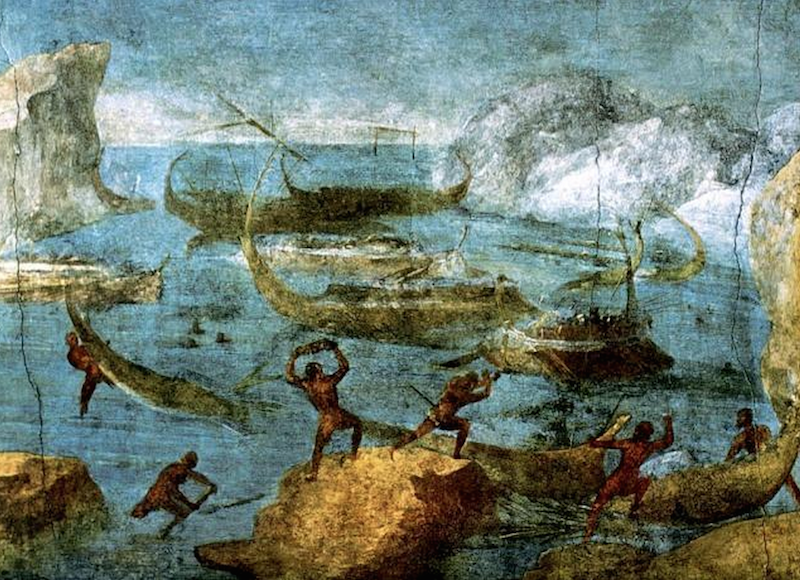THE LAESTRYGONIANS IN GREEK MYTHOLOGY
The Laestrygonians were a tribe of giants that are talked of within the surviving sources of Greek mythology; in particular the Laestrygonians are famous for their appearance in Homer's Odyssey.
The land of the Laestrygonians
|
The Laestrygonians were considered to be descendants of Gaia (Earth) and Poseidon, descending from a single son of the gods, Laestrygon.
Homer tells of their land being named Lamos, with a capital city called Telepylos. Homer's description of the land of the Laestrygonians would have it placed in the far north, for it was said to be a land where dawn occurred shortly after sunset. Despite this description, later writers place the land of the Laestrygonians upon Sicily. |
|
Odysseus and the Laestrygonians
Odysseus had departed the battlefield of Troy with his twelve ships intact, and with the help of Aeolus had even managed to come within sight of Ithaca. The greed of his own men though, had seen disaster fall upon Odysseus, and his ships were blown back to the realm of Aeolus.
With no more help forthcoming from Aeolus, Odysseus's men had rowed for six days and nights until they reached landfall.
A natural harbour, horse-shoe shaped anchorage surrounded by cliffs, proved a welcome respite and eleven of Odysseus's twelve ships anchored there. Odysseus though kept his ship outside the natural harbour, with perhaps Odysseus having some sense of foreboding.
With no idea where they were, nor whom they were likely to meet, Odysseus sent out three of his men to scout the land.
With no more help forthcoming from Aeolus, Odysseus's men had rowed for six days and nights until they reached landfall.
A natural harbour, horse-shoe shaped anchorage surrounded by cliffs, proved a welcome respite and eleven of Odysseus's twelve ships anchored there. Odysseus though kept his ship outside the natural harbour, with perhaps Odysseus having some sense of foreboding.
With no idea where they were, nor whom they were likely to meet, Odysseus sent out three of his men to scout the land.
|
Taking a wagon track these scouts came to Telephylos; meeting a girl of a height exceeding the norm, the three men were directed to the palace of Antiphates, the king of the Laestrygonians.
Still not knowing what type of people the Laestrygonians were, the scouts entered the palace. Meeting the wife of Antiphates, the men then knew they were in the company of giants, and when Antiphates entered his own palace, and grabbed up when of the men, and ate him, the surviving two knew they were in a land of giant cannibals. The two surviving members of Odysseus's scouting party ran back to the ships to warn their comrades, but at the same time Antiphates was raising his own people to action. Thus it was that even as the scouts returned to the ships, the cliffs surrounding the harbour were full of Laestrygonians. The giants threw down boulders shattering the ships, and leaving the floundering men easy targets to be picked up as the next meals for the giants. Only Odysseus's ship was outside the harbour, and at the first sign of danger, the anchor ropes were cut, and his surviving men took to their oars. Thus, Odysseus had arrived at the land of the Laestrygonians with twelve ships, he left with but one. |
|
|
|
Colin Quartermain - The Laestrygonians - 21st April 2019
